Analyst Downgrades Affect Baker Hughes, Union Pacific, and More

Market Reactions to Analyst Downgrades
Recent shifts in analyst perspectives have painted a more uncertain picture for several prominent companies in the market. These changes, particularly in the ratings of notable corporations, can often lead to fluctuating investor sentiment and stock performance.
Baker Hughes Company (NASDAQ: BKR)
Seaport Global analyst Tom Curran made a notable adjustment by downgrading the rating of Baker Hughes Company (BKR) from Buy to Neutral. Closing at $45.75 on the last trading day, this change signals a shift in outlook, making investors reconsider their positions regarding the energy sector.
Investment Perspectives
Investors already had their eyes on Baker Hughes as it navigates the complex landscape of oil and gas services. Analyst insights suggest a more tempered approach may be needed when considering future investments in this well-established firm.
Albemarle Corporation (NYSE: ALB)
Keybanc analyst Aleksey Yefremov followed suit, downgrading Albemarle Corporation (ALB) from Overweight to Sector Weight. With Albemarle shares closing at $71.60, this move could reflect broader challenges within the chemicals industry, emphasizing the need for careful evaluation amidst changing commodity prices.
Chemical Sector Responses
The chemical sector is particularly sensitive to fluctuations in market demand and commodity pricing. As such, investors may want to monitor Albemarle's performance closely, considering this recent downgrade.
Norfolk Southern Corporation (NYSE: NSC)
JP Morgan's Brian Ossenbeck made headlines by downgrading Norfolk Southern Corporation (NSC) from Overweight to Neutral, although the analyst did raise the price target from $282 to $288. Norfolk Southern’s shares finished at $277.70, indicating a mixed sentiment among analysts about the rail sector.
Rail Industry Dynamics
The rail industry's dynamics can sway significantly with economic trends. Investors are urged to consider the latest financial results and performance metrics when evaluating Norfolk Southern's prospects.
Novo Nordisk A/S (NYSE: NVO)
Barclays analyst Emily Field decided to downgrade Novo Nordisk A/S (NVO) from Overweight to Equal-Weight. With shares closing at $53.94, the new rating suggests that while Novo Nordisk maintains a strong position in diabetes care, the outlook may not be as bright as previously thought.
Healthcare Sector Insights
The healthcare sector remains a mixed bag, where companies like Novo Nordisk must consistently innovate in a competitive landscape. Keeping an eye on ongoing developments can be essential for investors looking to capitalize on the pharmaceutical opportunities.
Union Pacific Corporation (NYSE: UNP)
Lastly, Citigroup analyst Ariel Rosa’s downgrade of Union Pacific Corporation (UNP) from Buy to Neutral was significant, reflecting a slashed price target from $270 to $250. Union Pacific shares closed at $223.77, indicating that the rail giant is experiencing headwinds that may dampen future growth.
Future Outlook for Union Pacific
For Union Pacific, the road ahead may involve adapting to changing economic conditions and augmenting operational efficiency. Investors should remain alert to updates regarding the company's strategic responses to these challenges.
Conclusion
Analysts play a pivotal role in shaping market perceptions of companies, and understanding their ratings changes can help guide investor strategy. Baker Hughes, Albemarle, Norfolk Southern, Novo Nordisk, and Union Pacific represent a cross-section of industries grappling with unique challenges. As the market evolves, staying informed can be key to successful investing.
Frequently Asked Questions
What does a downgrade in analyst ratings mean for a stock?
A downgrade indicates that analysts have revised their expectations for a company's performance downward, which can lead to a decrease in stock prices as investor sentiment shifts.
How often do analysts change their ratings?
Analysts can change their ratings based on new data, market conditions, earnings reports, and economic indicators, making these changes relatively common, especially in volatile markets.
What should investors do when they see a downgrade?
Investors should assess their investment strategy, consider their risk tolerance, and possibly seek more information about the company's fundamentals before making decisions.
Are downgrades always negative for stocks?
While downgrades often result in immediate negative perceptions, the long-term impact may vary depending on the company's overall financial health and market conditions.
Where can I find more information about stock ratings?
Investors can find stock ratings through financial news websites, brokerage platforms, and dedicated analyst reports that cover recent changes and market analyses.
About The Author
Contact Thomas Cooper privately here. Or send an email with ATTN: Thomas Cooper as the subject to contact@investorshangout.com.
About Investors Hangout
Investors Hangout is a leading online stock forum for financial discussion and learning, offering a wide range of free tools and resources. It draws in traders of all levels, who exchange market knowledge, investigate trading tactics, and keep an eye on industry developments in real time. Featuring financial articles, stock message boards, quotes, charts, company profiles, and live news updates. Through cooperative learning and a wealth of informational resources, it helps users from novices creating their first portfolios to experts honing their techniques. Join Investors Hangout today: https://investorshangout.com/
The content of this article is based on factual, publicly available information and does not represent legal, financial, or investment advice. Investors Hangout does not offer financial advice, and the author is not a licensed financial advisor. Consult a qualified advisor before making any financial or investment decisions based on this article. This article should not be considered advice to purchase, sell, or hold any securities or other investments. If any of the material provided here is inaccurate, please contact us for corrections.
